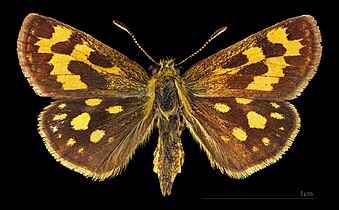Carterocephalus silvicola
| Carterocephalus silvicola | |
|---|---|

| |
| male | |

| |
| both in Estonia | |
| Scientific classification | |
| Domain: | Eukaryota |
| Kingdom: | Animalia |
| Phylum: | Arthropoda |
| Class: | Insecta |
| Order: | Lepidoptera |
| Family: | Hesperiidae |
| Genus: | Carterocephalus |
| Species: | C. silvicola
|
| Binomial name | |
| Carterocephalus silvicola Meigen, 1829
| |
| Synonyms | |
| |
Carterocephalus silvicola, the northern chequered skipper, is a species of butterfly of the family Hesperiidae.[1] It is found in northern Europe and the northern and eastern Palearctic.[2]
Description[edit]
The front wing length is twelve to 13 millimeters. The upper surface of the forewings is light yellow with large brown-black discal and small submarginal spots. The hindwings are basically brown-black in color with yellow spots arranged as in Carterocephalus palaemon and with an additional spot on the costa . The bottom is the same as the top. The female has slightly larger spots as well as a dark basal region and a dark outer edge.
-
Carterocephalus silvicola ♂
-
♂ △
-
♀
-
♀ △
The caterpillars are grass green when mature with pale dorsal and lateral dorsal lines. They grow up to about 25 millimeters long. Before hibernating, the caterpillars turn gray-yellow. They overwinter as adult caterpillars.
The pupa is pale yellow with brown vertical stripes
Biology[edit]
The butterfly flies from May to June depending on the location.
The larvae feed on various grasses.
References[edit]
- ^ Jeong, Su Yeon; Kim, Min Jee; Jeong, Na Ra; Kim, Iksoo (2019-07-03). "Complete mitochondrial genome of the silver stripped skipper, Leptalina unicolor (Lepidoptera: Hesperiidae)". Mitochondrial DNA Part B. 4 (2): 3418–3420. doi:10.1080/23802359.2019.1674725. PMC 7707257. PMID 33366020.
- ^ Zhang, Jing; Cong, Qian; Fan, Xiao-Ling; Wang, Rongjiang; Wang, Min; Grishin, Nick V. (2017-03-06). "Mitogenomes of Giant-Skipper Butterflies reveal an ancient split between deep and shallow root feeders". F1000Research. 6: 222. doi:10.12688/f1000research.10970.1. PMC 5373422. PMID 28408977.




